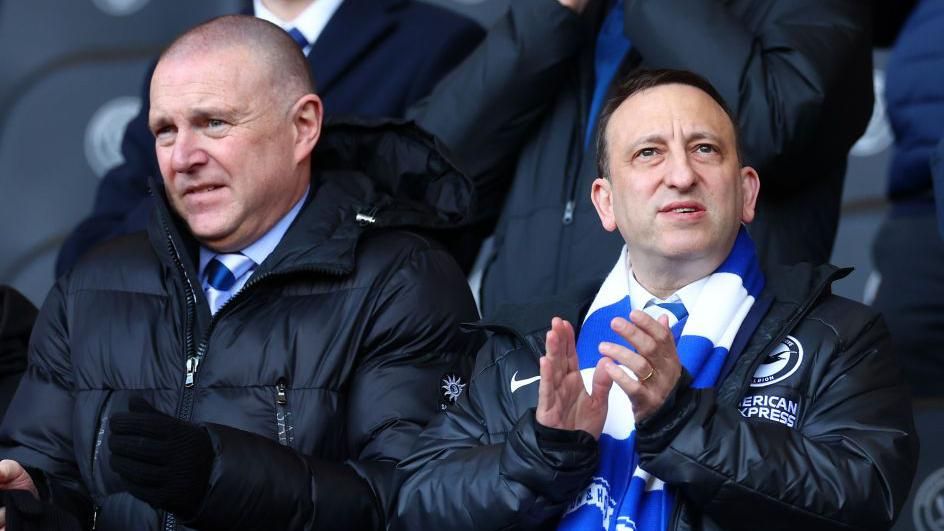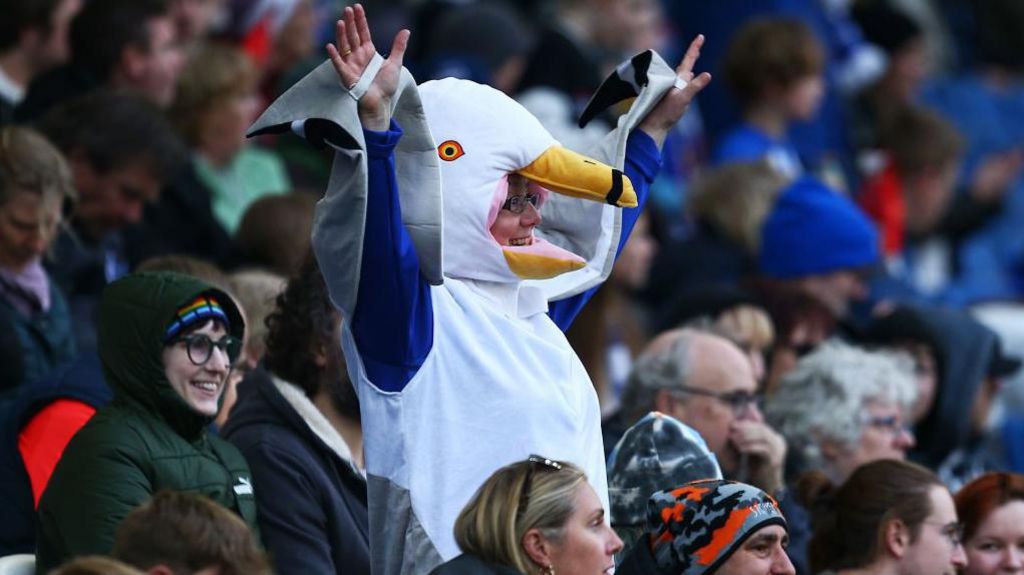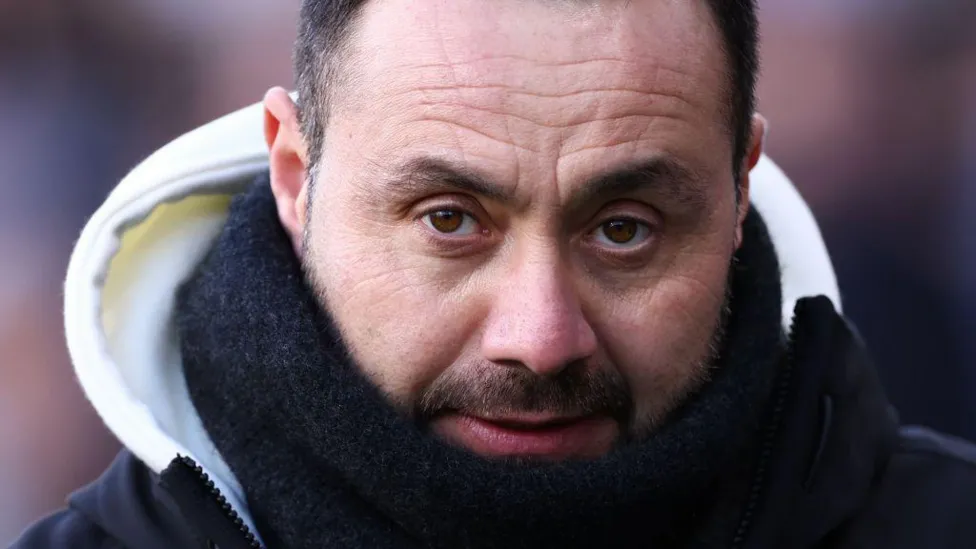“If that coffee machine was not working properly, I genuinely wouldn’t be surprised to see it on the lawn.”
Brighton chief executive Paul Barber is talking about his charismatic, perfectionist and coveted manager Roberto de Zerbi.
Outward assessments of the Italian can differ from the experience of those who work most closely with him.
What is clear is that De Zerbi has high standards and sets high targets. He doesn’t respond well to failure.
“We have learned what he says externally is a little bit misunderstood. He speaks with his heart on his sleeve.”
You get the strong sense Brighton are bored with the debate around De Zerbi’s future and would prefer to focus on other things.
That is understandable. But in an extended BBC Sport interview with Barber, one of those most forward-thinking Premier League executives, De Zerbi has to feature prominently, given speculation about the Italian’s future and links with some of the top managerial vacancies around Europe.
 IMAGE SOURCE,GETTY IMAGES
IMAGE SOURCE,GETTY IMAGESBrighton chief executive Paul Barber and owner Tony Bloom
‘We can’t control clubs coming in for De Zerbi’
Brighton enter the final week of what has been both a historic and challenging campaign with a realistic shot at finishing ninth, which would be their second-highest placing and second-highest top flight points tally. De Zerbi was also responsible for the best last season.
Yet for the second half of the campaign De Zerbi has behaved as though he has had enough of the ‘Brighton model’ and that he resents the restrictions imposed by it.
Barber does not offer clarity over the De Zerbi’s future. But he does confirm conversations have always been honest and open.
“Privately, Roberto is quiet, calm, reasonable and sensible,” says Barber. “He understands what our limitations are. Behind the scenes, the model is very well known to him.
“He has got two more years to go. My understanding is that he is happy. He likes the club. He likes this group of players a lot. He knows he has a good owner. He knows he has good facilities. He knows it is a club that has a particular model and we won’t break it for anyone. Those are consistent. He also knows he can see me or Tony (owner Tony Bloom) at any time. There are no surprises.
“What we can’t control is a club anywhere in the world coming in and making an approach for him. But we knew that with Graham Potter, and Chris Hughton, who did a great job for us. We are very cognisant of that happening to us but we have a plan for all those eventualities.”
The Brighton model and a lengthy injury list
In an era of over-spending, Brighton are viewed as the gold standard for how to run a club properly.
They do owe Bloom £373m and paid their owner £36m out of a club record £122.8m profit announced last month. But Barber points out a large part of that debt was because of construction of the Amex Stadium.
The stadium’s capacity can be increased beyond its current 31,876, but “by hundreds not thousands”, says Barber. A new fan zone is intended to keep people in the stadium vicinity longer, increasing spend and also taking some of the pressure off rail services that take supporters to and from the out-of-town venue.
But, for funding purposes, Brighton remain wedded to their model, which Barber has committed to with a new contract to 2030.
The philosophy is theoretically simple: scour the world for talent, which is recruited, honed and sold on for a vast profit. Think Moises Caicedo, signed as an 18-year-old from Ecuador for £4.5m, loaned to Belgian club Beerschot, then sold to Chelsea for £115m two years after his arrival.
However, Southampton and Leicester have been lauded in the past for their recruitment model. Both spent this season in the Championship when it went wrong.
Something as unpredictable as a crippling injury list – Brighton have lost Solly March, Joao Pedro, Kaoru Mitoma and Billy Gimour for long periods – can also send a season spiralling into freefall.
“Losing Caicedo and (Alex) Mac Allister, we knew it would be very difficult to replace them like for like overnight,” says Barber. “What we couldn’t foresee was the number of injuries to critical players at critical periods in the season.
“What Roberto has done to keep us in the top 10 and the last 16 of the two biggest knockout competitions has been remarkable. I don’t think he has got half as much praise as he deserves for that achievement alone.”
‘Chelsea have taken a lot of our good people’
For a time this season, when Brighton won twice and lost seven in 12 games over a two-month period to the end of April, it seemed cracks were appearing in a structure that has not only lost key players, but also manager Potter and key recruitment personnel Paul Winstanley and Sam Jewell to Chelsea.
“We have lost good people – and Chelsea have taken a lot of them,” says Barber.
“But they are taking the hose not the water supply. The water supply is Tony and the incredible data we use.
“We work very hard on succession planning. It is one of the things I am obsessive about. I try every day to think about what would happen if we were to lose one of our top 20-25 people, on and off the field. Not players – staff. Who would be the obvious replacement and where are they? Are they ready to step up?
“Player recruitment is not a perfect science. We have a ‘twin track’ of investing a lot of money in our academy to find players on our own doorstep and finding talent from parts of the world others are not even looking in, let alone recruiting from. It is that part which gives us confidence.”
 IMAGE SOURCE,GETTY IMAGES
IMAGE SOURCE,GETTY IMAGESBrighton fans at the Amex Stadium
The new ‘Amex generation’ of fans
Brighton’s back story is known to most football lovers. But their history of playing in Gillingham and nearly falling out of the league is lost on what are viewed as ‘the Amex generation’, younger fans who started following the club around the time they moved into their new stadium and know only good times.
Bloom explains: “When I arrived at Brighton in 2012, I would drive along the sea front and see Arsenal, Tottenham, Chelsea, Manchester United, Liverpool shirts. Now when you drive along the same stretch, almost without exception, you see kids in Brighton shirts.”
For them, this season, despite a European campaign most fans never remotely thought possible, might be viewed as average. Historically, it is anything but.
“I can understand why some people would say it has been an OK but not great season,” says Barber. “But it is only 11 seasons out of 123 that the club has even been in the top flight, let alone the top 10. It is an incredible time for the club and an incredible period for the fans.”
Barber on ‘complex concept’ of EFL deal
Which brings us to a major bone of contention for some.
How can Brighton, with their historical background in the EFL, be resistant to the ‘New Deal’ for EFL clubs, the proposed financial handout which the Premier League has put on hold?
“We understand why the EFL is concerned,” says Barber. “We understand why the government are concerned. But we want to be sure what we do is fair for everyone.
“There are clubs in the leagues below us who have owners who are wealthier than ours. The concept of working really hard and investing in Brighton’s case, over 26 or 27 years, to go from the basement of the Football League to a top-six position in the Premier League to create a relative amount of success for ourselves… To suddenly have to hand over the proceeds of that success to somebody without knowing how they will use the additional money, potentially on players with the aim of replacing us, is a complex concept.
“We need to fully understand the consequences.
“That is not to say, in our case, we have forgotten where we have come from, because we certainly haven’t, and it doesn’t mean to say we don’t consider the pyramid to be sacrosanct, because we do.
“We want the whole game to feel sustainable for every community in the country. But we can’t do that if it is going to damage our progress and our continuity and our stability. That would be bizarre.”

